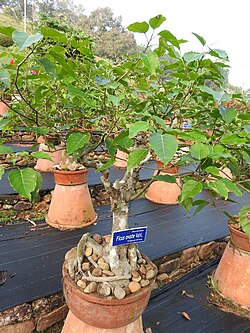Biology:Ficus laurifolia
This article may require copy editing for using complete sentences, adding {{cvt}}. (January 2024) (Learn how and when to remove this template message) |
| Ficus laurifolia | |
|---|---|

| |
| Scientific classification | |
| Kingdom: | Plantae |
| Clade: | Tracheophytes |
| Clade: | Angiosperms |
| Clade: | Eudicots |
| Clade: | Rosids |
| Order: | Rosales |
| Family: | Moraceae |
| Genus: | Ficus |
| Species: | F. laurifolia
|
| Binomial name | |
| Ficus laurifolia Lam.
| |
Ficus laurifolia is an hemi-epiphytic species that sometimes grows as a shrub or liana or as a tree, the species is within the family Moraceae.[1]
Description
The species grows as a shrub, a liana or as a medium to large sized tree that can reach an height of about 25 m,[1] the bark is grey while the slash is reddish to pale brown exuding a creamy white latex;[2] Stem is brownish in color with minute hairs. Its leaves are arranged spirallly, with petiole that sometimes reach 9 cm long, stipules are present and are usually glabrous and up to 5 cm in length.[2] The leaf outline is broadly elliptic to ovate, with leaflets that can reach 30 cm long and 20 cm wide with margins that are entire, the base of leaves tends to be cordate to rounded and the apex is acuminate.[2] Figs are usually borne on leafs axils or beneath the leaves, the figs are sessile or shortly pedunculate with receptacles, they tend to be oblong to globular in shape, greenish with white spots, peduncles are 3 - 5 mm long;[3] basal bracts are commonly paired.[2]
Distribution and habitat
Occurs in Tropical Africa, from Guinea-Bissau eastwards to Sudan and southwards to Mozambique.[2] Found in savannah woodlands, gallery forests and forest edges.[4][2]
Uses
A stem bark and leaf decoction is used in the treatment of gastro-intestinal infections.[4] The species is also planted as a shade tree.[5]
References
- ↑ Jump up to: 1.0 1.1 Berg, Cornelis C.; Hijman, Maria E. E. (1989). Moraceae. Flora of tropical East Africa / prepared at the Royal Botanic Gardens, Kew with assistance from the East African Herbarium. Ed.: R. M. Polhill. Rotterdam: Balkema [u.a.]. ISBN 978-90-6191-350-4.
- ↑ Jump up to: 2.0 2.1 2.2 2.3 2.4 2.5 Aweke, G. (1979) Revision of the genus Ficus L. (Moraceae) in Ethiopia. Meded. Landbouwhogeschool [Wageningen] 88: 1–115, ills., key, maps. URL: http://edepot.wur.nl/288670
- ↑ Ndolo Ebika, S. T.; Morgan, D.; Sanz, C.; Harris, D. J. (2018-08-09). "Ficus Species in the Sangha Trinational, Central Africa". Edinburgh Journal of Botany 75 (3): 377–420. doi:10.1017/S0960428618000173. ISSN 1474-0036. https://journals.rbge.org.uk/ejb/article/view/1713.
- ↑ Jump up to: 4.0 4.1 Kuete, Victor; Nana, Frédéric; Ngameni, Bathélémy; Mbaveng, Armelle Tsafack; Keumedjio, Félix; Ngadjui, Bonaventure Tchaleu (2009). "Antimicrobial activity of the crude extract, fractions and compounds from stem bark of Ficus ovata (Moraceae)" (in en). Journal of Ethnopharmacology 124 (3): 556–561. doi:10.1016/j.jep.2009.05.003. PMID 19450673. https://linkinghub.elsevier.com/retrieve/pii/S037887410900292X.
- ↑ Ipulet, Perpetua; Kasenene, John (2008). "Diversity of Genus Ficus L. ( Moraceae ) in farmlands and pastoral areas in Buganda region, central Uganda" (in en). African Journal of Ecology 46 (s1): 52–58. doi:10.1111/j.1365-2028.2008.00929.x. ISSN 0141-6707. Bibcode: 2008AfJEc..46S..52I. https://onlinelibrary.wiley.com/doi/10.1111/j.1365-2028.2008.00929.x.
Wikidata ☰ Q110502821 entry
 |

